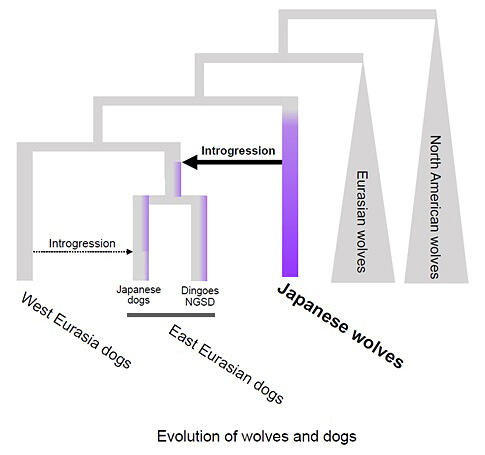A research group led by Associate Professor Yohey Terai of the Research Center for Integrative Evolutionary Science at the Graduate University for Advanced Studies, Professor Shuichi Matsumura of Gifu University, and the Anicom Specialty Medical Institute determined the whole genomes of 9 Japanese wolves and 11 modern Japanese dogs and found that, among all grey wolves, the Japanese wolf is the most genetically related to dogs. The results were published in Nature Communications on February 23.

Provided by the Graduate University for Advanced Studies
Dogs were the earliest domesticated creature and originated from the gray wolf (hereafter wolf). To date, the origin of dogs has been a mystery, as no wolves closely related to dogs have been reported. In this study, genome analysis revealed that (1) the Japanese wolf has a single origin and is a unique group genetically distinct from other wolves and (2) the genome of East Eurasian dogs contains the genome of the ancestor of the Japanese wolf. Japanese wolves inhabited Honshu, Shikoku, and Kyushu; however, they became extinct during the Meiji period (1868-1912). Type specimens of the Japanese wolf were sent by Siebold and others during the Edo period (1603−1868) and are in the collection of the Natural History Museum in Leiden, the Netherlands. In addition to genome information on Japanese wolves and Japanese dogs, data from the database were used to analyze information on 100 individuals, including wolves from North America, the Arctic, and Eurasia, as well as ancient wolves that lived during the Pleistocene epoch, ancient dogs, and modern dogs.
Analysis of phylogenetic relationships (evolutionary relationships) using whole genome information showed that the Japanese wolf was genetically distant from other wolves. It can also be inferred from phylogenetic trees (trees representing evolutionary paths) that this divergence of the canine ancestor most likely occurred in East Asia. DNA studies from bones and teeth of old wolves and dogs excavated in the Japanese archipelago may provide further insight into the origins of dogs.
Terai commented, "We successfully showed that dogs originated in East Asia based on the genome of the Japanese wolf, which is very familiar to Japanese people. Moving forward, I would like to study the ancient DNA of Japanese and Asian dogs and wolves to get closer to the origin of dogs. Moreover, we will clarify the origins of dogs in the Japanese archipelago and how they have changed over time."
Journal Information
Publication: Nature Communications
Title: Japanese wolves are most closely related to dogs and share DNA with East Eurasian dogs
DOI: 10.1038/s41467-024-46124-y
This article has been translated by JST with permission from The Science News Ltd. (https://sci-news.co.jp/). Unauthorized reproduction of the article and photographs is prohibited.




